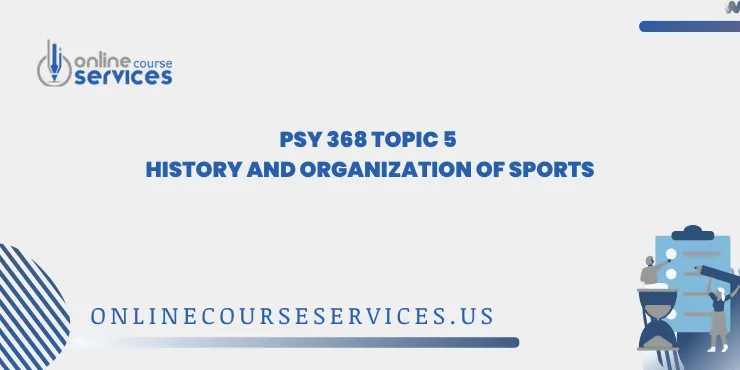- PSY 368 Topic 5 History and organization of sports.
History and organization of sports
While reflecting on the general learning within humanism and sports, this paper discusses the concerns of the body, culture, and the overall people surrounding sports. It looks at the progress within the human investigation of the body, which is, in certain affinities, informed by feminist poststructuralism.
Key Themes in Sports Sociology
This has a different fundamental relationship with a vital bundle of the issues and concerns or themes in the human investigation of sports. These concerns include the body, discography practices, bearing, domination or power, sport and the crucial bases of ways of dealing with behaving and disciplinary powers (Course reading).
Development of the history of sports
The written history, all through the shared once-overs of sports history, returns around seemingly forever back. The beginning of sports involved the blueprints for war or training for hunting. This was used in male individuals over the whole course of everything working out. This explains why the past game games involved throwing spears, shakes, stakes and sparring one-on-one with foes. The principal Olympic games were held in the 776BC.
Ancient Greek Sports Origins
This involved events, for instance, the round of chariot races, foot races, jumping sports, Javelin throwing, and wrestling. These were used in ancient Greece. Obsolete Greeks also hustled to introduce formal sports to the world officially. The above sports, not a tiny dab, shape, or configuration, is a wide once-over that gives a gander at the beginnings and development of the many sports most prominent today to use as a redirection (History, 2021).
Organizational culture of sports
This is the technique of values, an individual’s convictions, close by the standards of genuine ways of dealing with behaving everyone shares. Understanding organizational culture helps with knowing the cutoff points, how an individual should act closely, and whether organizations or organizations should act in an introductory manner.
To act precisely helps fit into many cultures. This is a top measure in enlistment. It comes to knowing and understanding the organizations. It’s about the gatherings and organizational culture that isn’t precisely self-evident. Indeed! The gathering has a splendid bond.
PSY 368 Topic 5 History and organization of sports
These two are genuinely astounding, being that the organizational culture of sports is the information, limit-building, and understanding of what is being referred to by each other, players, and all individuals. At the same time, the pack’s organizational culture understands all players and individuals from the gathering. Their behaviour and information on the gathering are limited (By and Large Sports Accomplice, 2018).
Importance of governance within sports
Governance in sports is vital for helping maintain and enforce rules and guidelines and building respectful ways of dealing with the behaviour of all individuals, gatherings, sports, organizations, and businesses, among others.
Reasons why governance is in place.
These standards are set up to help supervise, support, and monitor all organizations hosting sports. They are intended to maintain and execute the integrity, reasonableness, and goodness of the principles and guidelines for both individuals from organizations and game contenders (International Olympic Warning Gathering, 2016).
Conclusion
Throughout the development and examination of the earlier weeks in sports, the sociology of sports, and elements of psychology, we uncover numerous principles and the functioning of sports organizations worldwide. Using sistering organizations like the International Olympic Committee, NBA, NFL, and International Hockey Federation, among many others, we see how governance structures integrate psychological aspects into sports.
These insights align with the PSY 368 Topic 5 History and Organization of Sports, helping us understand why such organizations are essential in managing and sustaining sports teams globally. These findings provide valuable perspectives on what keeps sports thriving today.
References
Global sports partner (August 28, 2018). Organizational culture in sport. Training. Global sports.
Pub. (2018). Retrieved from: https://intelligence.globalsportsjobs.com/organizational-culture-in-sport
History, (2021). Sports. History stories of sports. History.com, Pub. (2021). Retrieved from: https://www.history.com/tag/sports
Houlihan, B., & Malcolm, D. (2016). Sport and society. Thousand Oaks, CA: SAGE. Pub. (2016). ISBN-13:9781446276181, URL:
International Olympic Committee (2016). Roles and responsibilities during the Olympic games. Pub. (2021). International Olympic Committee. Retrieved from: PDF file.

